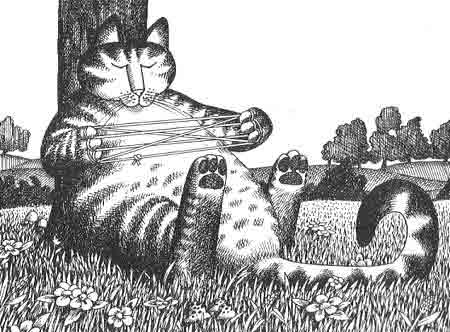一圈小小的细绳,可以翻出层出不穷的花样,它还能把素昧平生的一老一小在某一短短的时间内连接在一起。

By Mark Gottlieb
叶佳期 选注
The two girls stepped onto the elevated train straight from school, still wearing the mock-sailor uniforms required of all students in the Japanese public education system.[2] Obviously classmates and friends, both looked to be no more than 10 years old.
Tokyo’s public transit system is usually crowded at every hour of the day, so it was something of a minor miracle that both girls managed to find seats for themselves. Nonetheless, they would have to ride separated from each other by a central aisle, which was itself soon jammed with standing fellow passengers.[3]
Denied the pleasure of an after-school chat, one of the girls fell asleep almost immediately. But her classmate remained wide awake, and to pass the time of what would now be a solo journey, she pulled from her tunic[4] pocket a loop of string Slowly, and with great concentration, she proceeded to weave the piece of twine into one of the myriad intricate webs of ayatori.[5] “Aya” refers to something made with string. “Tori” means “to take,” as when being handed something. Thus, ayatori —the game that Westerners know as cat’s cradle.
Seated next to the nimble-fingered schoolgirl was a woman whom I judged to be about 80 years old. In my head I dubbed her “Oba-san,” the Japanese word for auntie.[6] Since boarding the train five or six stops earlier, Oba-san’s face had remained frozen in a stoical deadpan.[7] Yet when she noticed the first cat’s cradle figure appear in the hands of the diminutive[8] rider seated to her right, something in Oba-san’s attitude changed. She started to sneak additional sideways glances at the tiny fingers of her fellow passenger,[9] and soon she began to smile.
I was standing not far from this tableau, and although I understand only a few words of Japanese, it was easy to interpret what was occurring as Oba-san finally addressed her seatmate.[10]
“I used to play this game when I was your age,” she must have said. “May I have your string for a moment? Perhaps I can remember a figure or two.”
Already steeped in traditional Japanese respect for elders, the schoolgirl relinquished her string without a word.[11] Then she watched, wide-eyed, as Oba-san tentatively entwined her fingers in the proffered loop and began to manipulate it.[12]
Shadows of concentration, puzzlement, and mild frustration passed across the woman’s face as she struggled to recall the patterns and finger movements that once must have been second nature[13] to her. For a minute she muttered quietly to herself, but at last she nodded happily and said “So, so, so...” as she held up her hands and showed the little girl the string figure she had created.
By now Oba-san was smiling broadly, as if she had just encountered a long-lost friend. She seemed delighted to find herself once again beguiled by a childhood passion, and pleasantly surprised at having remembered how to produce some of the shapes and images she recognized from so long ago: sandam bashigo (“three-step ladder”), kawa (“the river”), amanogawa (“the Milky Way[14]”).
If my estimate of Oba-san’s age was roughly accurate, the span of her life would have included difficult times as well as harmless pleasures. Yet as I watched her play ayatori —as she twisted and turned her still delicate fingers to create an ever-changing gallery of string figures[15]—the years melted away from her like a half-remembered dream. Before my eyes she became innocent, playful, and eager for fun.
Before long we approached the child’s station, and she rose to disembark[16]. Oba-san seemed reluctant to return the loop of string that had given her so much joy, but she finally did so with a wistful[17] smile and her whispered thanks.
Then the train came to a halt at the platform, the doors opened, and the girl was gone—anonymous among the 12 million souls in the great city, and perhaps never knowing how much happiness she had bestowed on an old woman whom she would likely never see again.[18]
Vocabulary
1. beguile: 使陶醉,使着迷;loop:(绳、线等打成的)圈,环。
2. elevated train: 高架火车;mock-sailor uniform: 仿水手制服。
3. aisle: 过道,通道;jam:拥挤。
4. tunic: 束腰外衣。
5. twine: 细绳;intricate: 错综复杂的;ayatori:〈日〉即英语中的cat’s cradle,翻绳儿(又叫挑绷子)游戏,把线绳圈绕于两手手指上,翻出各种花样形状。
6. dub: 给……起绰号(称为);Oba-san: 欧巴桑,是日语的直接发音,原意为“大嫂,阿姨”,泛指中老年妇女。
7. stoical: 恬淡寡欲的;deadpan:〈俚〉无表情的脸。
8. diminutive: 特小的。
9. sneak: 偷偷地做;sideways: 斜向一边的。
10. tableau: 人构成的画面或场景;interpret:理解,领会;address: 向……说话。
11. steep: 使浸泡,使渗透;relinquish: 交出,让给。
12. tentatively: 尝试性地;entwine: 缠绕;proffer: 让给,提供;manipulate: 熟练操作。
13. second nature: 第二天性,习性,此处形容老妇人曾经对该游戏十分熟悉。
14. Milky Way: 银河。
15. twist: 缠绕,扭;gallery: 画廊,收藏,此处指所有翻绳儿花样的集合。
16. disembark: 下车。
17. wistful: 惆怅的。
18. anonymous: 无名的,姓氏不明的;soul: 人;bestow: 给予,赠给。
(来源:英语学习杂志)